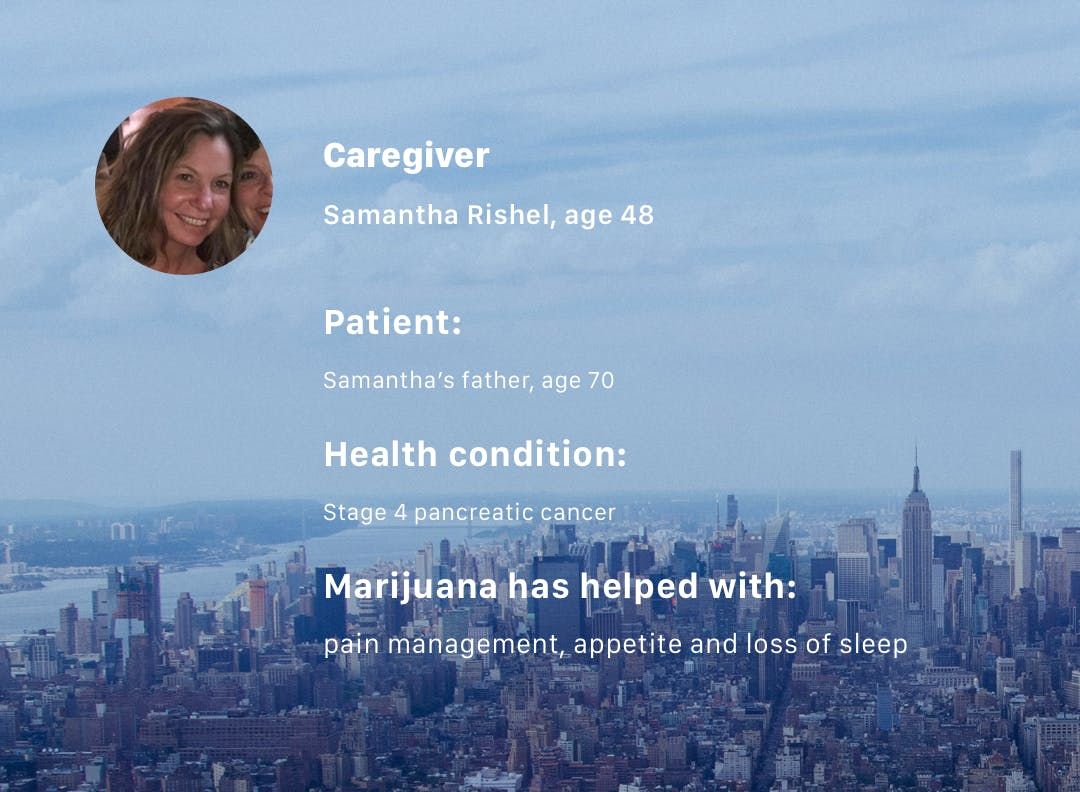New York’s medical cannabis program currently serves over 33,000 registered patients. Samantha Rishel has been taking care of her father, who has cancer and has been using medical cannabis since September 2017. This is her family’s story about how medical cannabis has helped with her father’s pain management, appetite and loss of sleep.
Samantha’s 70-year-old father, who has stage 4 pancreatic cancer, was feeling tired and weak the day we scheduled our call so she spoke on his behalf. It wasn’t her first time in the role of advocate for her dad, who became a certified New York medical cannabis patient in early September.
Trying Cannabis as an Alternative to Percoset
“He started to use it for pain management specifically,” Samantha began, explaining that the Percoset he’d been using for pain was causing side effects. “He would actually let his pain get to a point where it was a lot and then take the Percoset, because while he knew it would relieve the pain, he was going to get the accompanying constipation.”
RELATED: OPIOID-INDUCED CONSTIPATION
After a friend shared his personal experience taking cannabis as a cancer patient, Samantha started researching the medicine as an alternative to Percoset—which contains both opioid and non-opioid painkillers. She was aware of the state’s program and that her father had a qualifying condition, but she would soon face her first obstacle.
“The Department of Health lists all of the doctor referrals within each county, and there are zero in Jefferson County,” she says, “so my concern was, how do I do this? Do we go to his doctor, and he has doctors in Oneida County, in any county but this one?”
Through researching online, she discovered a potential solution: Not only did Vermont have medical cannabis program, but the state had decriminalized cannabis. “I was looking into driving up there to see what I could find in terms of tinctures and whatever,” Samantha says with a chuckle, “and hopefully not get picked up for speeding.”
But instead of having to drive three hours to Burlington, VT, Samantha connected with a pharmacist at PharmaCannis in Liverpool. “He explained to me how to go on and register (for the medical cannabis program), and the various things that cannabis would probably help with,” she says. “I just thought this this would be better than what the opioids were doing to my dad.” Samantha now had everything she needed to broach the subject with her father.
He was receptive but hesitant. “My father was concerned about a possible psychotropic effect, which I understand,” she recalls, “but after speaking to numerous people at the dispensary, that’s not what happens. You’re not going to get goofy.”
Within a few days of receiving the information, her father was ready to sign up. “I think at that point he had done the research he wanted to do and didn’t feel I was just pushing him, like “C’mon dad, smoke some weed!” she laughs.
Becoming a Cannabis Advocate
After getting certified in September and adjusting the dosages to suit his needs, the progress started quickly. “It improved his appetite greatly. He’s less anxious. It has definitely helped with the pain management as he hasn’t had a Percoset in 10 days. He hasn’t had a need or desire for it,” Samantha says. “The constipation is completely gone, so everything we had hoped that it would do, it has done for him.”
Her father first started using tinctures and had recently introduced vaping into his regime. “He took to it really well, more so than I thought he might,” Samantha says, adding, “He was a little resistant at first, what with the culture surrounding vaping.” But the quick delivery provided by this form of administration soon eliminated any concerns.
RELATED: BENEFITS OF VAPING MEDICAL MARIJUANA
Samantha now drives two hours roundtrip every three weeks to pick up medicine for her father at PharmaCannis’ Liverpool dispensary. Her father’s progress makes every trip worth it and has turned Samantha into a passionate advocate.
“I just wish people were more accepting of [medical marijuana],” she says. “Every medical person we have come into contact with—with my father’s hospitalizations, with various patient navigators, and actually we met with and are working with hospice at this point—we have had zero negative feedback.”
Samantha is in the process of connecting the hospice facility with PharmaCannis to hopefully have the dispensary provide education and outreach at a local Wellness Fair in her community. “I just think more people need to know, and I’ve become this advocate. Anybody that we’ve spoken to, they have a lot of questions, and I’m trying to direct them and get it set up so that people up here can partake in this and know about it as an option.”
Stigma Aside, Marijuana Has Made a Difference

Samantha wanted to share a few important messages from her family about her father’s progress with medical cannabis. “My mother asked me to tell you that she definitely sees a difference in [my father’s] appetite, the fact that he’s sleeping through the night, and then obviously with the pain management,” she says. “He hasn’t had a Percoset in 10 days now. No need for it.”
The second message comes from her father, first about getting certified as a patient. “It was extremely easy to register for this,” she emphasized on his behalf. “The referral [via video call with a HelloMD doctor] was very easy and went quickly.”
He also wanted people to understand that titrating the medicine is part of the process and takes time. “You’re really working with body weight, and what might work for somebody who’s 100 pounds might not work for someone who’s 180 pounds,” Samantha explains. “It was really just jumping around with the dosage, and they found a dosage that works.”
Samantha had one more thought to add before signing off. “There’s a stigma on this that shouldn’t be, and the stigma is because it’s marijuana,” she says. “It’s not bad. It has helped my father in every possible way that we could have hoped.”
Prologue: A Painless Passing
Days after our conversation, Samantha let us know that her father had not taken or needed a Percoset in 20 days. “That is [to all of us] incredible,” she wrote in her note.
Five days later, Samantha sent the following note:
I wanted to let you know that my father died this afternoon. His entire pain management program, following his decision to end chemotherapy, was medicinal cannabis. He continued to use the MC in conjunction with morphine and Atavan over his final three days and experienced what we observed to be a painless passing.
Again, thank you for your interest in our story. My family is thankful for the immense relief the MC provided for my father (and us). It made this entire experience more tolerable in that my father was spared the harsh side effects he experienced early on from the opioids he was prescribed.
Feel free to incorporate this information into your article. I believe it’s important and should be shared.
Thanks again,
Samantha Rishel
If you’re new to cannabis and want to learn more, take a look at our Cannabis 101 post. HelloMD can help you get your medical marijuana recommendation; it’s easy, private and 100% online.






